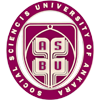The European Credit Transfer and Accumulation System (ECTS) is a student-centered system based on the student workload required to achieve the objectives of a program of study. These objectives should preferably be specified in terms of learning outcomes and competences to be acquired.
ECTS is based on the principle that 60 credits measure the workload of a full-time student during one academic year. The student workload of a full-time study program in Europe amounts in most cases to around 1500-1800 hours per year and in those cases one credit stands for around 25 to 30 working hours.
Credits in ECTS can only be obtained after successful completion of the work required and appropriate assessment of the learning outcomes achieved. Learning outcomes are sets of competences, expressing what the student will know, understand or be able to do after completion of a process of learning, long or short.
Student workload in ECTS consists of the time required to complete all planned learning activities such as attending lectures, seminars, independent and private study, preparation of projects, examinations, and so forth.
Credits are allocated to all educational components of a study program (such as modules, courses, placements, dissertation work, etc.) and reflect the quantity of work each component requires to achieve its specific objectives or learning outcomes in relation to the total quantity of work necessary to complete a full year of study successfully.
http://ec.europa.eu/education/resources/european-credit-transfer-accumulation-system_en
